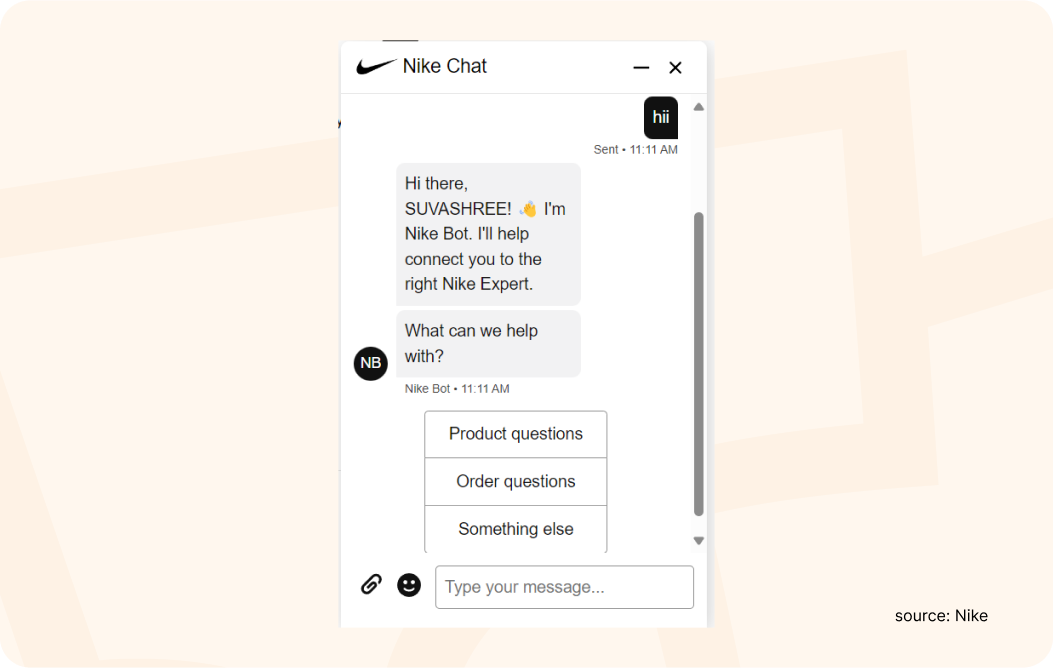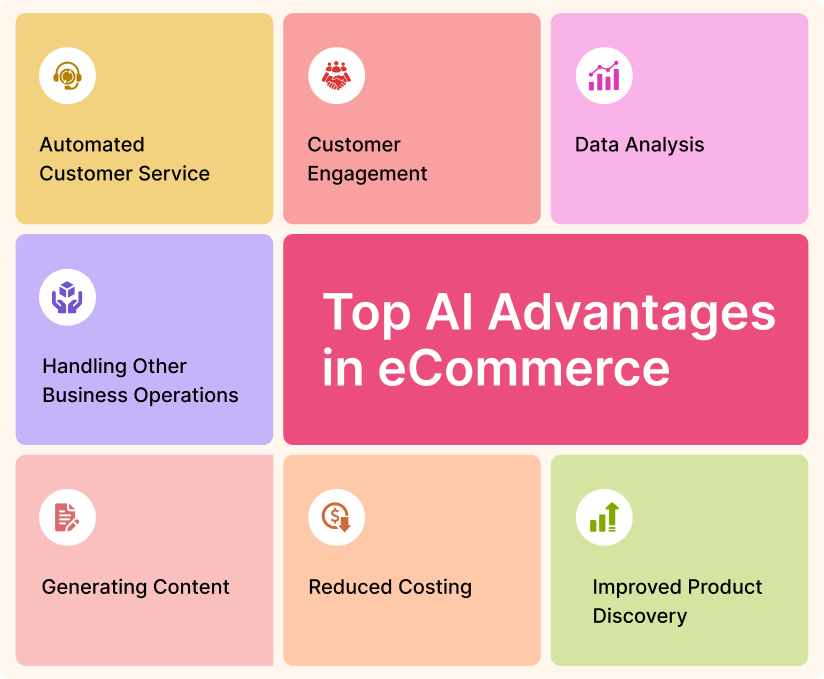10 Best Examples of AI in eCommerce + Use Cases
- October 17, 2024
- 15 mins read
- Listen

Table of Content
According to a PwC report, nearly 71% of large businesses have already implemented AI in their operations, and this number is expected to grow. To offer best-in-class services to customers and streamline internal processes many big eCommerce brands are setting examples of using AI in the smartest ways. So, what will AI in the eCommerce industry look like?
In this blog article, we have discussed what is AI in eCommerce, the benefits it can bring to your online business, and highlighted 10 best examples of using AI in eCommerce, with some use cases. Keep reading this space to know more.
What is AI in eCommerce?
In simple terms, AI in eCommerce refers to the use of artificial intelligence technologies to automate many different operations including customer service in an online business.
With AI and natural language processing technologies, advanced tools like chatbots help eCommerce business owners to offer the best in terms of services, and products and also automate many parts of their businesses.
When integrated with your online store—whether it’s a website, mobile app, or other platforms—AI can:
- Interact with customers in real-time
- Offer product recommendations
- Provide a personalized shopping experience
- Track shipments and order details
- Send reminders for abandoned cart recovery etc
10 Best Examples of AI (Artificial Intelligence) in eCommerce
Many major eCommerce giants have already integrated AI into their business strategies to provide their customers with exceptional experiences. How are they doing this? Here, I’ve compiled 10 real-life examples of businesses leveraging AI in their eCommerce operations, adding something extra and delivering that wow factor in their service.
1. SHEIN: Personalized Product Recommendations
AI can collect customer data, including past orders, browsing history, saved items, and geographic location. With the help of advanced algorithms, and technologies it uses this information to offer personalized shopping recommendations, understand customer preferences, and suggest products they might like.
SHEIN, a popular global fashion retailer, uses AI to enhance its customer experience. When a customer adds items to their cart, AI suggests additional products that match their interests or complement the items in their cart, providing an extra level of personalization.
2. Zara: Inventory Management
Inventory management is one of the most important parts of any online business. Poor handling can lead to overstocking unnecessary products, resulting in wasted money, or stockouts, where you accept orders but can’t fulfill them due to insufficient stock. So, managing all these is a huge task and Chatbots make it simple for you.
These smart AI bots efficiently handle inventory management by regularly checking product availability, tracking and monitoring shipments, verifying order details, and detecting any unusual activities in the supply chain. All these happen automatically, without human intervention.
Zara, a well-known fashion brand, utilizes AI technology to streamline its inventory management. Through their BOPIS (Buy Online, Pick-Up in Store) policy, customers can order products online via Zara’s website or mobile app and pick them up at a nearby store. Zara’s AI system efficiently manages inventory by checking the availability of items in-store, allowing customers to place orders based on current stock levels.
This initiative significantly improves the customer experience by reducing wait times. Customers can avoid long queues by placing their orders online and collecting their items in-store, saving both time and effort.
3. Starbucks: Voice Shopping
Gone are the days of spending countless hours browsing through product catalogs. Today, we demand fast, convenient, and efficient online shopping experiences. Conversational commerce has become a major trend, thanks to advanced technologies like Artificial Intelligence (AI) and Natural Language Processing (NLP). Modern chatbots can now understand the human voice, grasp the context, and respond accurately in voice format. This means you can simply express what you’re looking for, and the chatbots will present products that match your preferences.
In voice shopping, platforms like Amazon Alexa or Google Assistant use voice recognition technology to help users shop online through voice commands. Starbucks, the renowned global coffeehouse chain, has integrated this technology into its app with a feature called ‘Voice Order.’ This enables customers to place orders online using just their voice.
4. eBay: Personalized Shopping Experience
By using data on customer behavior—such as order history, past chats, purchasing patterns, and browsing habits—AI chatbots can understand individual preferences and choices. With these insights, the chatbots can suggest products tailored to customers’ interests, offer immediate personalized assistance, and recommend upsells and cross-sells, all contributing to increased sales.
One of the notable examples of using AI in eCommerce is eBay ShopBot. Operating through Messenger, this bot delivers personalized assistance and an exceptional experience by helping customers with shopping, providing instant responses to their queries, and performing a variety of other tasks.
5. Myntra: Visual Search
Visual search is one of the most powerful features of AI, providing customers with the ability to visually search for exactly what they’re looking for.
Many times, on the website, we need to go through so many catalogs to find out what we are looking for. Visual search with the help of AI makes this process much easier. On the website or mobile app, there will be an option to upload a photo of a product that we are looking for. Once we upload that, AI automatically searches and shows all the products available on the website that are similar to what we are looking for saving both our time and effort.
Big fashion retailer Myntra, offers this same feature on their website and app, whereby uploading what we are looking for, AI automatically shows all the products that match our image reference. Isn’t it great?
6. NIKE: Automated Customer Service
A recent Salesforce survey shows that 23% of companies are already using chatbots, with another 31% planning to do so. Customers often leave brands that don’t offer instant support or provide a poor experience. If you want to avoid this, you need to deliver top-notch service and ensure your buying process is seamless and personalized.
Chatbots make this possible by providing instant, 24/7 assistance and personalized shopping experiences. Take Nike, for instance. The brand is well-loved not just for its products but also for its commitment to great customer service. Their chatbot named Stylebot offers immediate help and allows customers to design and customize their sneakers from available styles, ensuring something extra for their customers.
7. Mondelez International: Product Research and Development
With advanced technologies like NLP and AI, modern chatbots are now instrumental in research and product development. These bots gather a wealth of information, including customer behavior, preferences, and choices. With such info, companies can customize their product offerings to meet customer needs.
Mondelez International, a global food giant known for our beloved brands like Oreo, Toblerone, Clif Bar, and Tate’s Bake Shop, has effectively leveraged this advantage. They utilize bots in their research and development efforts, tapping into the efficiency and accuracy of AI that surpass human capabilities.
8. DRINKS: Wine Business Platform
The wine industry is embracing AI to enhance the customer experience. By utilizing AI-powered bots, wineries can collect customer data and offer personalized recommendations, whether customers are visiting a winery or shopping online. For example, if a customer prefers white wines, AI can ensure they see the best options available in that category.
DRINKS is an example of new technology that supports starting an online alcohol business. Whether you’re a small-to-medium business adding a Shopify App to your existing store or an enterprise integrating with the DRINKS WaaS platform API, you can rely on AI to manage compliant alcohol transactions across the USA.
9. Emotive: Personalized Marketing Messages
Bots play a crucial role in marketing. By gathering detailed information on your target audience and industry, AI enables you to personalize your marketing and advertising efforts to effectively reach different customer segments. With advanced algorithms, AI can determine the tone and language that resonate most with your audience, helping you craft unique marketing communications.
A great example of an AI tool for eCommerce businesses is Emotive. It helps you personalize SMS messaging for various customer profiles. With the help of AI, it also provides insights into how your marketing messages are performing, allowing you to make further improvements.
10. Hungryroot: Personalized Meal Recipes
AI offers valuable support to businesses, including those in food delivery. Using its advanced market research capabilities, you can gain insights into your target audience’s favorite foods and customize your menu to match their tastes.
Hungryroot, a food recipe and delivery service, has effectively utilized AI in this way. Specializing in healthy, gluten-free, and vegan options, they use AI-powered bots to analyze customer behavior and preferences. This allows them to create personalized recipes and menus, offering tailored recommendations for each delivery.
How AI is Changing the eCommerce Landscape
First, let’s look into some of the important stats:
- 36% of marketing executives report utilizing chatbots and AI-driven customer support to engage with customers in their organizations. (Capgemini)
- Nearly half (49%) of US adults have used AI for customer service within the past 12 months. (eMarketer)
- By 2027, approximately 25% of organizations will rely on AI chatbots as their primary customer service channel. (Gartner)
- Global retail spending on AI bots to soar to $72 billion by 2028, up from $12 billion in 2023. (Juniper Research)
As you can see, the use of AI in the eCommerce industry is rapidly gaining popularity. But why? Because AI tools are transforming online businesses into more intelligent, faster, and customer-oriented operations. Smart AI can help eCommerce companies provide efficient customer service, enhance customer engagement, and drive higher sales conversions, while also creating new opportunities and innovations.
Beyond automating customer service and other business operations, AI collects valuable customer data, enabling online businesses to offer more personalized experiences. So, rather than taking over, AI uses smarter technologies to personalize, streamline, and enhance various aspects of the eCommerce business.
Benefits of AI in eCommerce
For your eCommerce business, AI helps to deliver the best experiences to your customers, better engagement, and ensure they are happy and satisfied with your brand. These are the three key objectives every eCommerce business works hard to achieve, and AI makes it easier to reach these goals.
Keep in mind: if your customers aren’t happy, your business won’t survive. AI not only helps you boost customer satisfaction but also paves the way for increased sales. Let’s explore the benefits AI offers for your business:
-
Automated Customer Service
AI bots can replicate human conversations and efficiently handle customer queries 24/7. When your customer service agents are busy with other tasks or face a high volume of inquiries, it can be difficult for them to manage everything at once. Hiring extra staff to handle the load can be costly, but advanced chatbots offer a cost-effective solution. These bots fully automate customer service, allowing you to assist multiple customers simultaneously and provide instant support whenever it’s needed.
REVE Chat is one such great AI-powered platform that integrates seamlessly with your website, mobile app, and other social media platforms like Facebook, Viber, Instagram, Telegram, and WhatsApp. It not only automates customer service but also streamlines various business operations, ensuring 24/7 support. Want to experience REVE Chat for yourself? Sign Up for a 14-day free trial today.
-
Customer Engagement
One of the biggest advantages of using AI is the exceptional customer experience it provides. AI allows you to personalize every interaction by fetching out specific details about each customer, such as past chat history, buying behaviors, and previous orders. The bot then engages with that customer on a personal level, acting as a shopping assistant and guiding him/her through the buying journey. With this personalized approach, it’s easier for you to get some satisfied and loyal customers for your online business.
-
Data Analysis
AI solutions can analyze a variety of data points, including customer reactions to marketing and advertising campaigns, business operations-related data, total orders, customers’ buying journeys, past purchases, and browsing behaviors.
By consolidating this information into comprehensive reports, AI helps eCommerce brands gain valuable insights into their performance and identify areas for improvement to get the best results.
-
Handling Other Business Operations
In addition to customer service, AI also automates and streamlines many other business operations for eCommerce. This includes automating and managing inventory management, order tracking, various business data consolidation, customer churn prediction, marketing, and other advertising activities. As AI technology evolves, more advanced tools are emerging to offer even greater benefits to eCommerce businesses.
-
Generating Content
Content is king, and creating engaging content for your eCommerce website is very important for capturing customer attention. AI can assist with everything from keyword research to crafting relevant content. It helps generate and optimize product descriptions, features, and even social media posts to boost engagement. With AI, brands can effortlessly produce high-quality content that resonates with their audience with minimal effort.
-
Reduced Costing
AI tools enable eCommerce brands to automate many business operations that would otherwise require human resources. AI platforms can efficiently manage tasks such as market research, customer support, answering general queries throughout the day, inventory management, and content creation. This reduces the need to hire additional staff, saves money, minimizes errors, and ultimately increases customer satisfaction and ROI.
-
Improved Product Discovery
Often, customers add products to their cart but forget to complete the purchase. AI can track these abandoned carts and automatically send reminders to those customers about the items they left behind. These notifications serve as gentle prompts, encouraging customers to return and place their orders. This strategy is effective and can significantly boost sales.
AI Use Cases in eCommerce
Various technologies, such as digital transformation tools, SaaS, AI, and virtual reality, consistently enable the eCommerce industry to offer innovative experiences to their customers. While you may know about several eCommerce use cases, you might not realize that artificial intelligence is the driving force behind many of these advancements. Let’s explore some AI use cases in eCommerce in more detail.
-
Personalized Product Recommendations
With the help of AI bots, it’s now much easier to collect customer details from their online purchases, such as past orders, returns, and buying behavior. AI uses this data to offer personalized product recommendations to customers. For instance, if a customer buys a beautiful dress, AI might suggest matching accessories like jewelry or shoes. Leveraging machine learning, AI can analyze a customer’s preferences and provide tailored recommendations. This often leads to additional purchases, increasing overall sales.
Major brands like Amazon, eBay, and Myntra consistently offer these personalized services to their customers.
-
Automated Customer Service
The Watson blog shows that brands spend $1.3 trillion each year on customer support calls. This cost includes staffing enough agents to provide 24/7 assistance, often resulting in a misuse of human resources that could be allocated to more productive tasks. AI chatbots address this issue by simulating human conversation and managing multiple chat requests simultaneously, around the clock.
This allows human agents to focus on more complex responsibilities. These bots can handle everything from answering customer queries to offering shopping recommendations and tracking order history. Companies like Sephora and H&M use chatbots to deliver top-tier service to their customers.
-
Pricing Optimization
Dynamic pricing has been around for years, with companies adjusting product prices based on demand and supply. A McKinsey study found that adopting a dynamic pricing model can boost sales by up to 5%. Additionally, research by PwC reveals that 60% of shoppers make purchasing decisions based on price. AI takes this concept further by automating the entire process. Through machine learning algorithms, AI tools help businesses analyze and identify different customer personas, generate customer-centric analytics, and set product prices accordingly.
-
Inventory Management
AI technology analyzes recent market trends, sales data, customer buying behavior, and future product demand enabling brands to avoid overstocking and understocking. By leveraging these insights, businesses can better align their inventory with customer needs. Walmart, for instance, utilizes AI to efficiently manage inventory across its vast network of stores.
-
Warehouse Automation
AI bots streamline various warehouse operations such as order management, packaging, shipping, and delivery. By automating the entire workflow from order placement to delivery, these bots ensure smooth and efficient operations, reduce human errors, and cut down on labor costs.
AI also offers real-time monitoring and reporting, enabling brands to refine and enhance their processes regularly. Companies like FedEx leverage AI to automate and optimize their distribution and delivery systems.
-
Fraud Detection
AI uses advanced algorithms to analyze transaction data and patterns, detect unusual behavior and fraudulent activities. It protects both companies and customers from losses. As AI incorporates machine learning, it becomes increasingly adept at providing advanced protections over time. This helps companies preserve customer trust and uphold their brand reputation.
For example, PayPal uses AI to carefully scrutinize transactions and identify any suspicious activities related to payments and account transfers.
-
Sales Forecasting
AI can forecast sales trends by analyzing different segments like market research and customer preferences. This insight helps eCommerce brands craft targeted marketing and advertising strategies, and understand product demand, seasonal trends, and consumer buying behavior. By recognizing these sales trends, businesses can build more effective sales funnels and refine their overall processes and strategies.
-
Cross-Sell and Up-Sell
As discussed in my previous pointers, AI tools check customer buying behavior and understand their preferences and choices. Based on that, suggest product recommendations.
Based on customer information, these bots suggest complementary products or create personalized product bundles that align with a customer’s preferences, increasing the average order value. This approach helps businesses enhance upselling and cross-selling efforts. For instance, on Amazon, if you add a bed to your cart, it will recommend matching pillow covers. This is a prime example of effective upselling in action.
Wrapping Up!
If you’re looking to provide top-tier services to your customers, an AI chatbot is the perfect solution for your brand. While you may not use all of the AI applications mentioned above for your eCommerce business, implementing even a few can bring the big difference. It will help to manage your business operations in a better way, boost customer satisfaction, and keep you ahead of the competition.
Frequently Asked Questions
AI bots gather and analyze a wide range of customer data, including past orders, brand interactions, buying behavior, and preferences. Using this information, AI enables eCommerce businesses to provide personalized services to their customers. Additionally, AI aids in market research and creates tailored content for marketing campaigns, enhancing customer engagement.
Moreover, AI provides real-time personalized assistance to multiple customers simultaneously, allowing eCommerce brands to deliver exceptional service to their customers.
With machine learning technology, chatbots are becoming increasingly smarter. They efficiently manage inventory, forecast sales trends and product demand, and provide real-time information on logistics, orders, shipping, and delivery.
AI algorithms also calculate the most efficient delivery routes by considering factors like traffic, weather conditions, fuel costs, and delivery windows. This results in faster deliveries and reduced fuel consumption.
AI offers a wide array of automation capabilities for eCommerce business enhancing customer service, streamlining business operations, and increasing sales conversions.
The key areas where AI automation can be helpful include: customer service, inventory management, order processing and fulfillment, customer segmentation, market research, supply chain and logistics, dynamic pricing, managing returns and replacements, customer data and analytics etc.
Yes, AI helps eCommerce businesses of all sizes. While large brands may have more resources to invest in advanced AI solutions, small and medium-sized businesses can also opt for AI to manage their customer service, business operations, and other tasks.
AI is set to transform the future of eCommerce in remarkable ways. It brings advanced tools for enhancing customer service, personalizing shopping experiences, conducting in-depth market research, and improving logistics and inventory management. By enabling eCommerce brands to offer tailored experiences, AI will boost customer satisfaction and loyalty.











